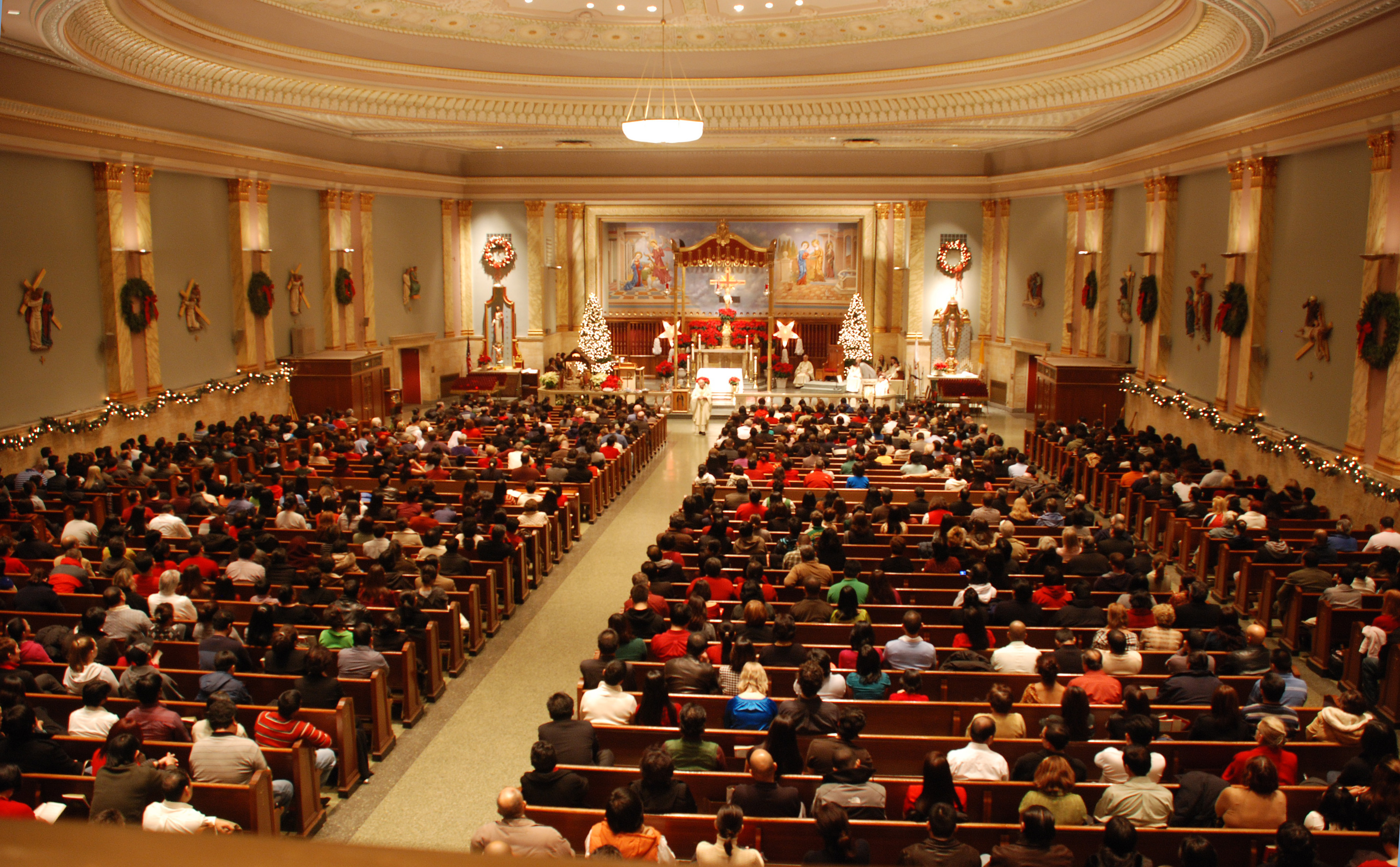ViaCrucis
Confessional Lutheran
- Oct 2, 2011
- 39,806
- 29,473
- Country
- United States
- Gender
- Male
- Faith
- Lutheran
- Marital Status
- In Relationship
- Politics
- US-Others
The Apocrypha was in the Bible Jesus read, and was actually in the Bible close to 2000 years and was only removed in the last century. How is it that God wanted these writings as a part of His book and just recently they were removed. Did God say " Oh those were a mistake and should be omitted?
Questions over the Deuterocanonical books is a large topic. The point I was making is that the Bible consists of books which have been preserved and passed down by tradition in the Christian Church. The Bible exists because of the Church.
And I am not wrong about Christmas. Christmas Day did not start off as Jesus birthday and we know He was not born December 25.
Christmas did start off as the celebration of Jesus' birth, that's what it is. And no, we don't know that He wasn't born on December 25th. There is nearly a 1/365 chance that He was born on any day of the calendar year, and so there is at least a 1/365 chance of Him having been born on December 25th.
There are historical and biblical arguments for a winter birth for the Lord. Does that mean He absolutely was born on December 25th? No. But the claim that He couldn't have been is simply not true.
And most importantly: Christmas is not Jesus' birthday. Christmas is the celebration of Jesus' birth. That is a very important distinction here. Even if Jesus was born on a June 14th or a February 3rd, that wouldn't change anything about Christmas. Christmas would still be on December 25th. Because Christmas isn't about celebrating Jesus' birthday--the anniversary of His birth on the day of His birth--it's about celebrating His birth, the event itself.
CBS news said "Christmas is really about bringing out your inner pagan," historian Kenneth C. Davis told "CBS This Morning." According to Davis, Christmas was celebrated as early as the fourth century, suggesting that it had almost nothing to do with Jesus Christ.
With all due respect to this Kenneth Davis fellow, he's wrong. Yes, the earliest mention of Christmas celebrated on December 25th dates to the 4th century, specifically it dates to 354 AD, that's the earliest mention of Christmas on December 25th on official calendars.
The Council of Nicea met together in 325 AD, in the fourth century, and the Nicene Creed is very much absolutely about Jesus.
Just because a part of the Christian calendar is late doesn't make it wrong.
We celebrate the Lord's birth out of our voluntary freedom in Jesus Christ. As St. Paul says, that one man esteems one day over another. We have the freedom in Jesus to worship Jesus, and in that freedom we voluntarily have set aside days of the year for special observance.
That's not wrong, that's biblical.
In ancient Rome there was a feast called Saturnalia that celebrated the solstice. What is the solstice? It's the day that the sun starts coming back, the days start getting longer. And most of the traditions that we have that relate to Christmas relate to the solstice, which was celebrated in ancient Rome on December 25.
That's wrong. The Saturnalia NEVER FELL ON DECEMBER 25th. The Saturnalia began on December 17th and lasted until December 23rd at its longest. I say at its longest, because depending on the time period in Roman history, the Saturnalia lasted from as few as three days to as many as seven days. At its maximum length of seven days, it lasted from December 17th until December 23rd.
Therefore it never occurred on December 25th.
From Wikipedia:
"Saturnalia was an ancient Roman festival and holiday in honour of the god Saturn, held on 17 December of the Julian calendar and later expanded with festivities through to 23 December. The holiday was celebrated with a sacrifice at the Temple of Saturn, in the Roman Forum, and a public banquet, followed by private gift-giving, continual partying, and a carnival atmosphere that overturned Roman social norms: gambling was permitted, and masters provided table service for their slaves as it was seen as a time of liberty for both slaves and freedmen alike.[1] A common custom was the election of a "King of the Saturnalia", who would give orders to people, which were to be followed and preside over the merrymaking. The gifts exchanged were usually gag gifts or small figurines made of wax or pottery known as sigillaria. The poet Catullus called it "the best of days".[2]"
I can only find the Latin here, and I am relying on machine translation (and trying to then edit it to make it readable) to help me out--so I invite those who actually know Latin to correct where I almost certainly am mistaken. At any rate, here is the text from Macrobius' Saturnalia, Book I, Chapter X, 23
"Abunde iam probasse nos aestimo Saturnalia uno tantum die, id est quarto decimo Kalendas, solita celebrari: sed post in triduum propagata, primum ex adiectis a Caesare huic mensi diebus, deinde ex edicto Augusti quo trium dierum ferias Saturnalibus addixit: a sexto decimo igitur coepta in quartum decimum desinunt, quo solo fieri ante consueverant"
"I have already demonstrated that we esteem the Saturnalia on a single day, that is, on the fourteenth before the Kalend(?) in the usual manner, but first after the addition of three days to the calendar by [Julius] Caesar, then Augustus decreed that the Saturnalia should be a three-day celebration; beginning on the 16th and terminating on the 14th of the usual custom(?)."
That is to say, originally the Saturnalia was held on the 14th day before the Kalends of January, which under the pre-Julian calendar was December 19th. Under Julius Caesar the Roman calendar underwent reform, and two days were added to December (Rome used inclusive counting) and as such this shifted the date of the Saturnalia to the 16th day before the Kalends of January, or December 17th. Julius Caesar's successor, Augustus made a decree which expanded the Saturnalia from a single day, to a three day festival, from December 17th until December 19th. Thus lasting from the 16th before the Kalends of January to the 14th day before the Kalends of January. So that both the traditional date and the new date were included in the celebration.
So when Christianity became the official religion in a sense, in Rome, they were able to fix this date. ... There's a little discrepancy about it but there's no question that the fact that it was celebrated in Rome as an important day with gift giving, candle lighting, and singing and decorating houses really cemented Christmas as December 25."
And most of those things weren't "Christmas" things at the time. The giving of gifts, decorations, etc are all much later customs. Yes, some of those customs are vestigial from pre-Christian Pagan wintery customs. The giving of gifts in wintertime does have precedence in the Saturnalia, but the idea of giving presents on Christmas comes much later in history. Gift-giving wasn't part of the original Christmas. Neither was tree decorating. Those are much later, and in some cases, extremely modern practices that are totally non-essential to the celebration of Christmas.
Or, just so there's no confusion, this is Christmas:

This is not Christmas, this is just cultural fluff that is how some people celebrate Christmas:

Another custom we can thank the pagans for? Christmas trees. Davis explained that the evergreen trees signaled the "return of life" and "light" as the winter solstice meant the days were starting to get longer.
"They started to hang an apple on it, so little red balls on green trees — get the picture here? ... So all of these things celebrate the idea that life and light are coming back into the world, which is essentially what Christmas means to Christians around the world."
Davis also pointed out that the very first instance of a "war on Christmas" actually dates back to the Puritans in the mid-17th century.
The origins of the Christmas tree date to the middle ages, chiefly in places like Germany. Where it was popular for Christians to put on Mystery Plays. A popular one involved a mystery play about the Garden of Eden and the Fall, and part of that was the decorating of trees with apples representing the Tree of the Knowledge of Good and Evil. As it so happens, Church authorities didn't much care for this, as they believed it was celebrating man's fall from grace. And so such Mystery Trees were forbidden by Church leaders.
The people, rather than giving it up altogether, instead began to have Christ Trees, and towns would set up trees around Christmas time to celebrate Christ's birth. For in the Incarnation the Light of the World had come. At some point in the 16th century some German Christians began to bring trees inside of their homes, decorated with candles to further emphasize the symbolism of the light of Christ in the dark of the world. This practice became especially popular among Lutherans and other Protestants.
The Puritans forbid Christmas because the Puritans were anti-Catholic moralizers who also burned innocent people of witchcraft. I'm not sure why so many people think we should emulate the Puritans--they were intolerant, violent religious fantastic who were far worse than the oppressors in England they were escaping.
"They knew all of these things, the date, the traditions, were pagan ideas. The Puritans banned Christmas for 20 years in America before the celebration became just too popular."
They forbid Christmas because they hated Catholicism. The whole reason of their existence was their belief that the English Church was still "too Catholic", and so they wanted to purge anything they deemed "too Catholic" or "popish" from their religious practice. As such, Christmas was forbidden.
They didn't reject it because it was "Pagan" they rejected Christmas because Catholics celebrated Christmas and they hated Catholicism.
Davis should know better if he's a historian.
Christmas is not Biblical. Many Roman traditions are not Biblical. Many American customs are not Biblical. We just need to be careful that we know what we are doing and why. What are the origins of our traditions and are they what we stand for? If we don't we are just the blind leading the blind. People can do whatever they want. It is their business, their traditions, whatever but at the end of our lives, we are going to have to answer for why we were celebrating on Pagan holidays, and what made us think God wanted us to do certain things that He never told us. God is pretty clear about what He wants celebrated in the Bible. That is all I am saying.
Having a printed Bible in your hands to read in English isn't Biblical either.
So "not biblical" in the sense of "the Bible does not command something" does not mean it's bad.
The Bible doesn't say anything about sitting in pews at church, but there's nothing wrong with having seating at church.
-CryptoLutheran
Upvote
0

